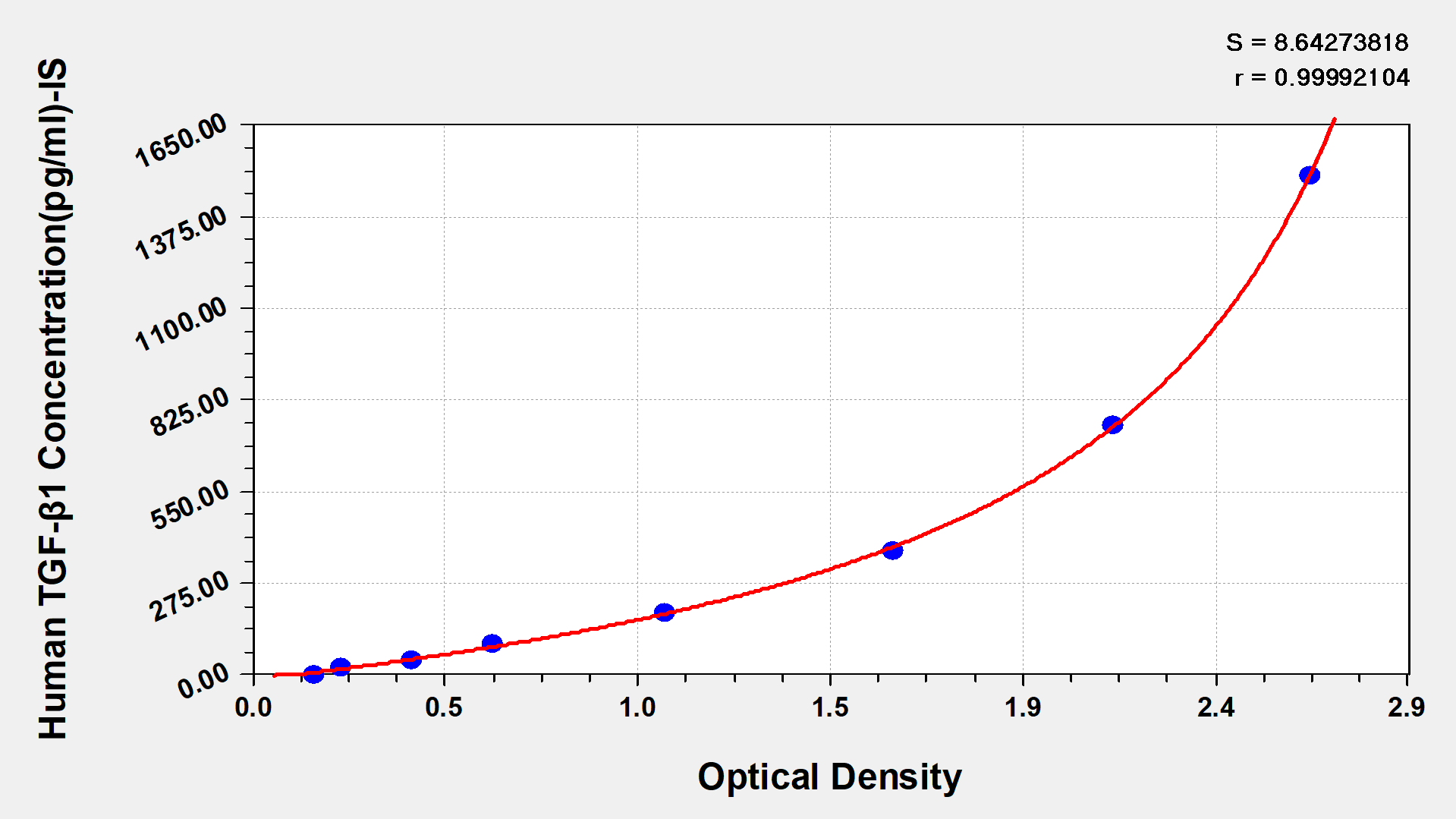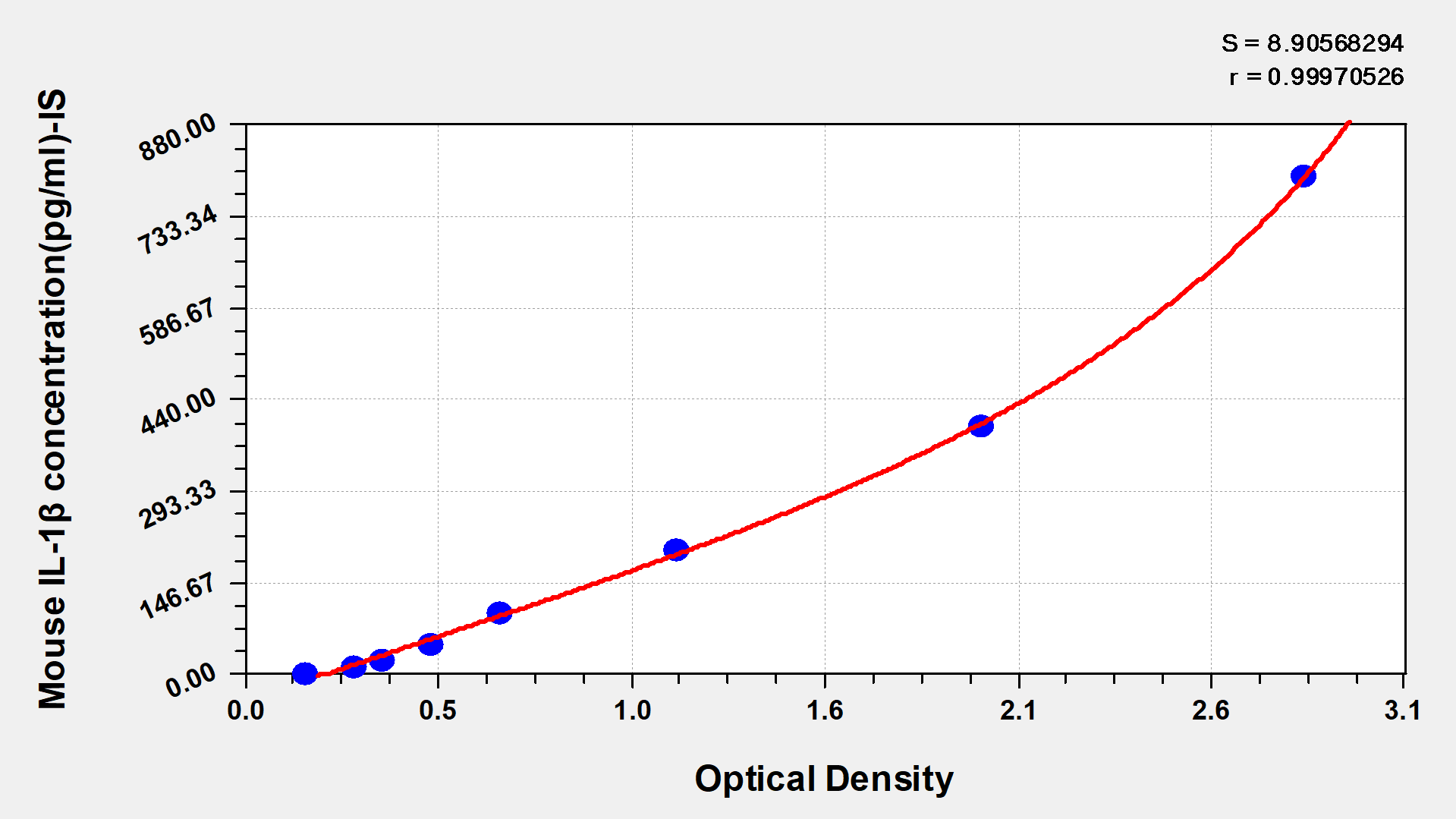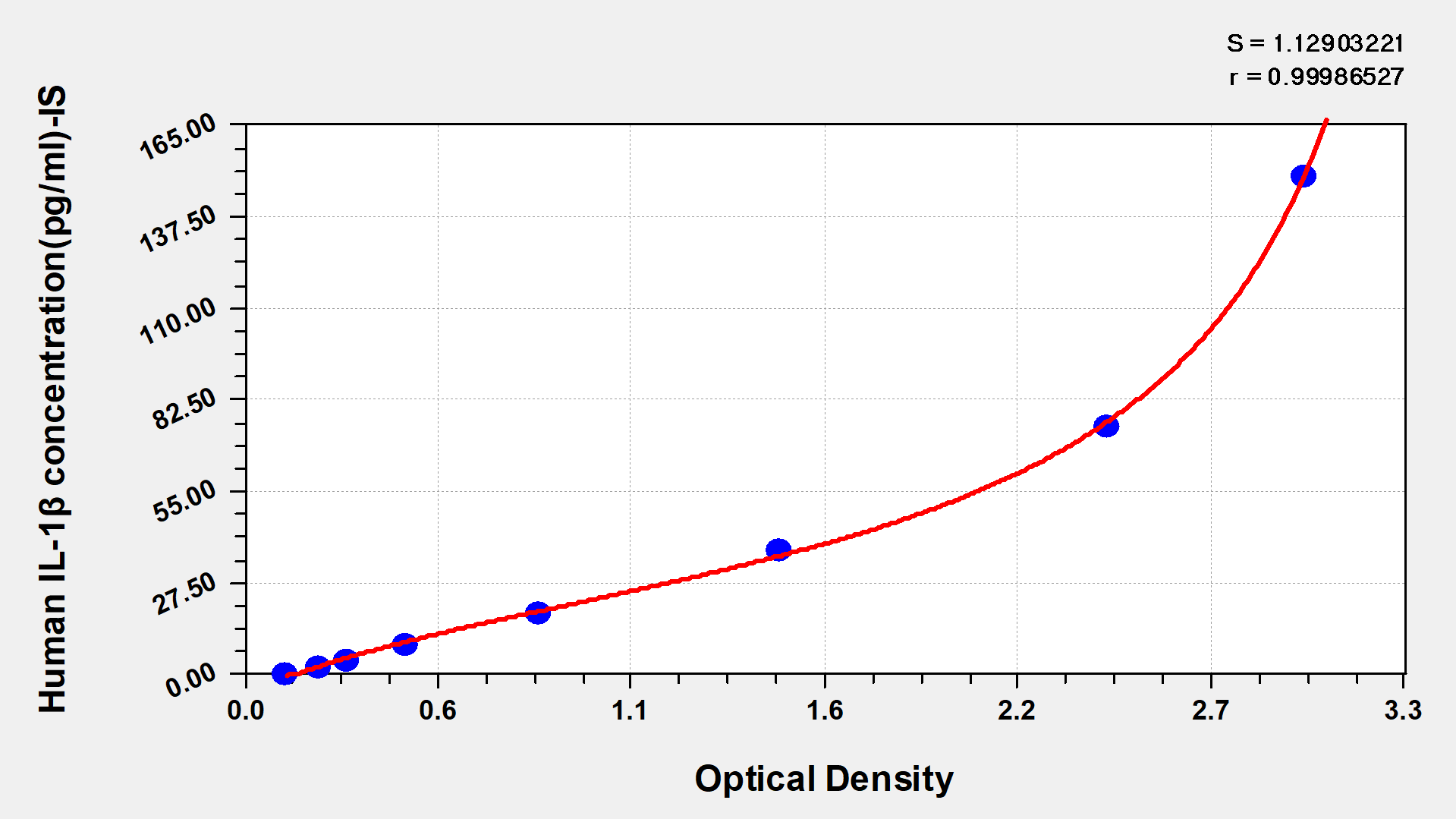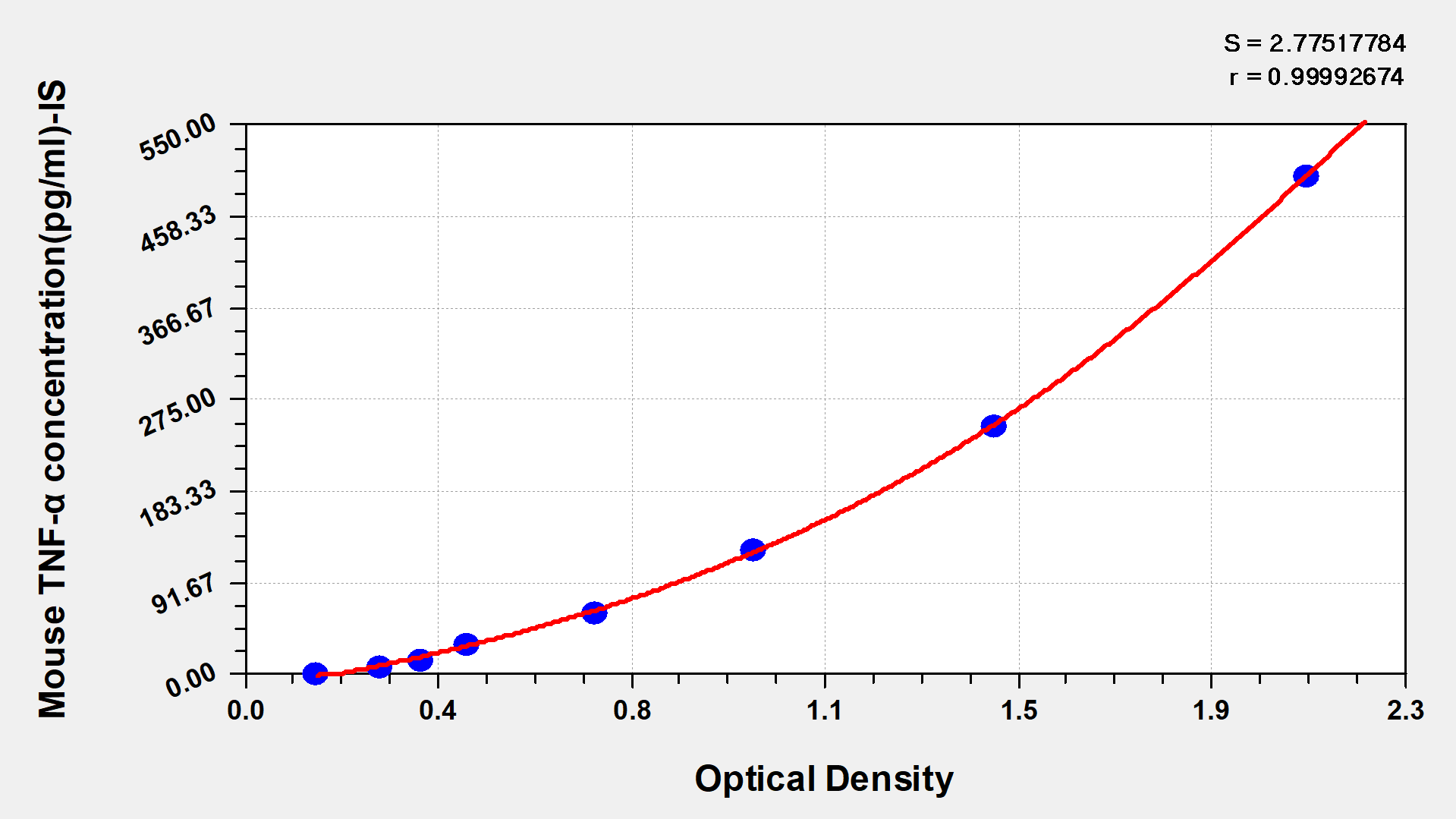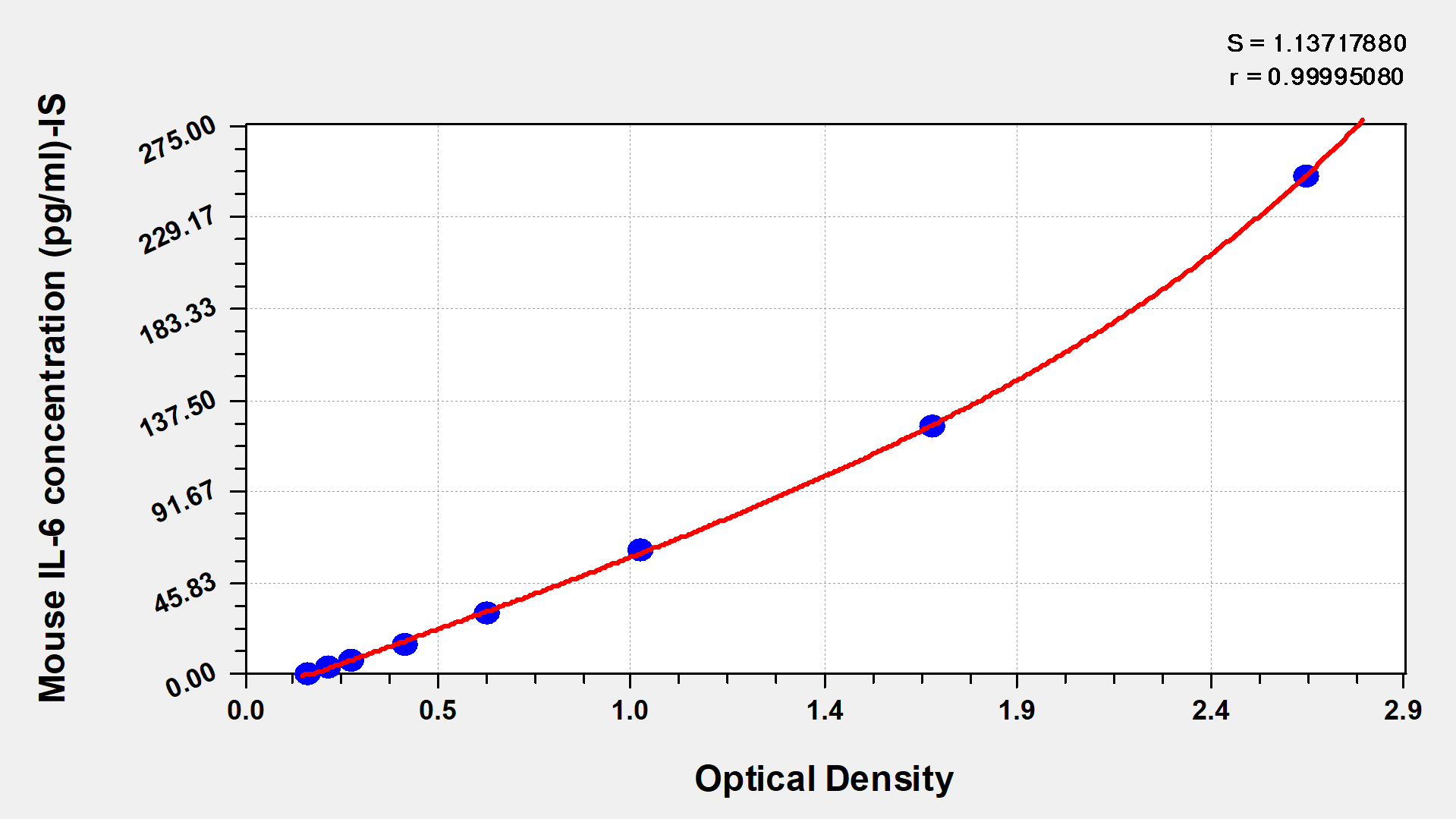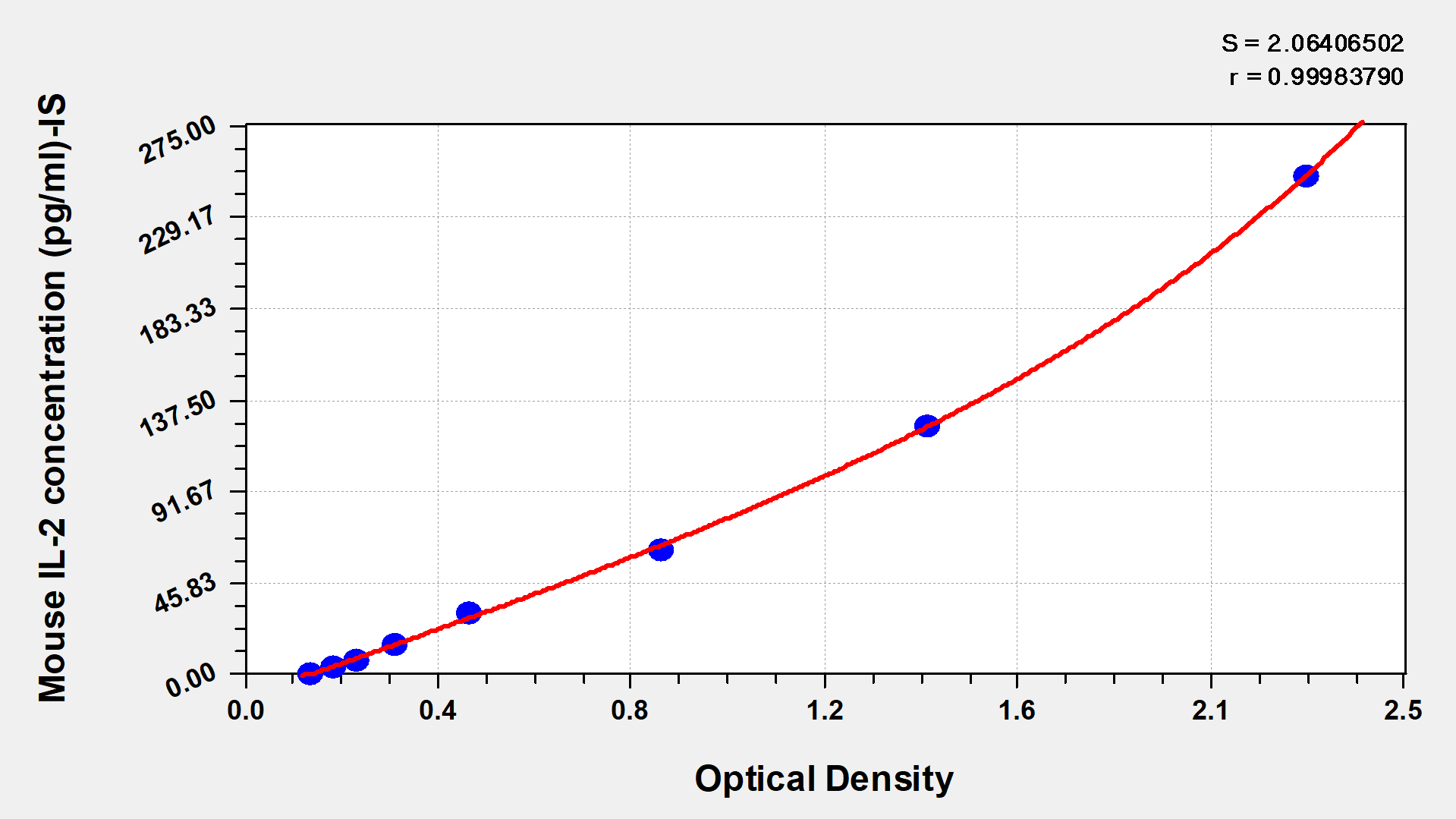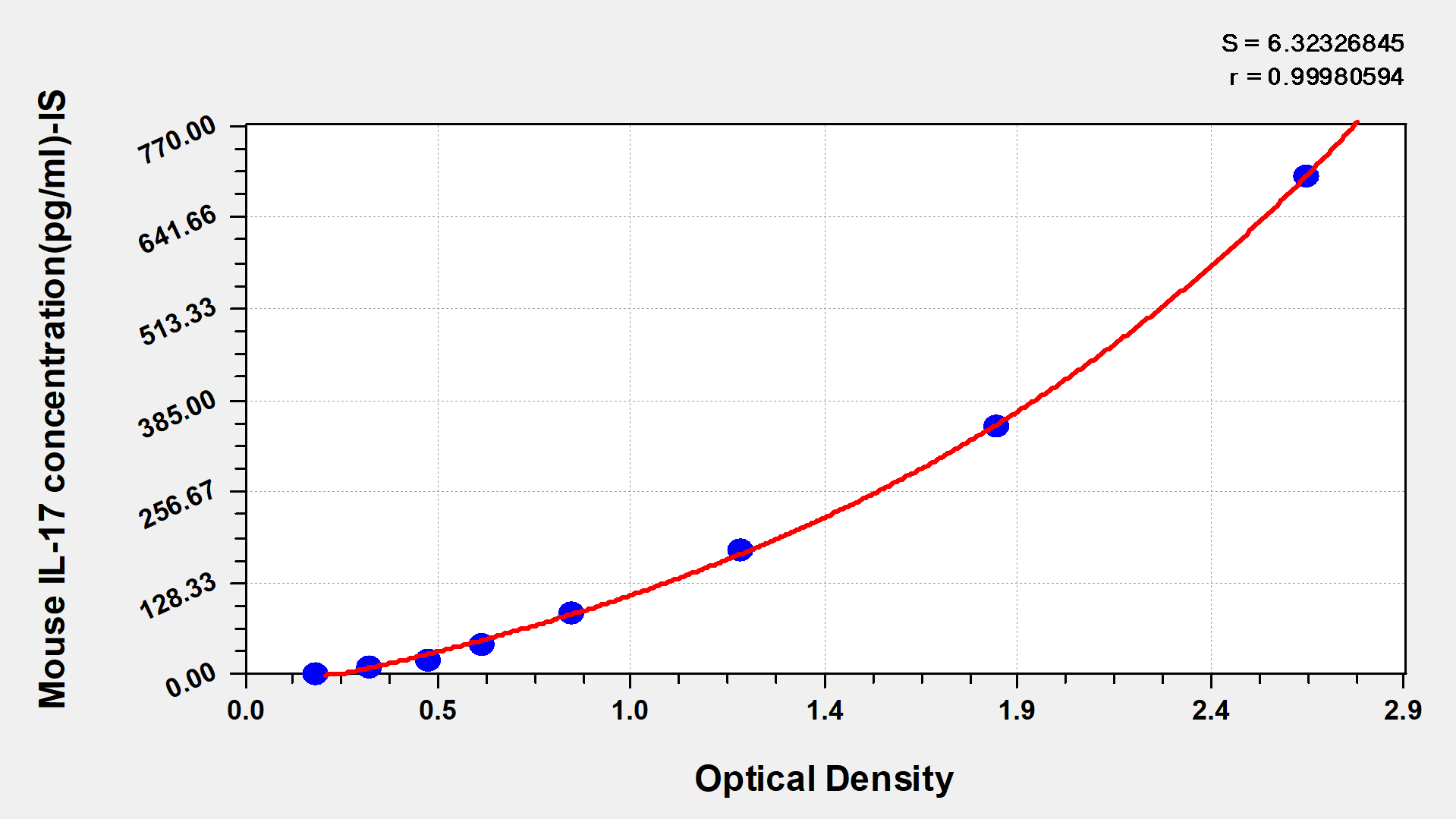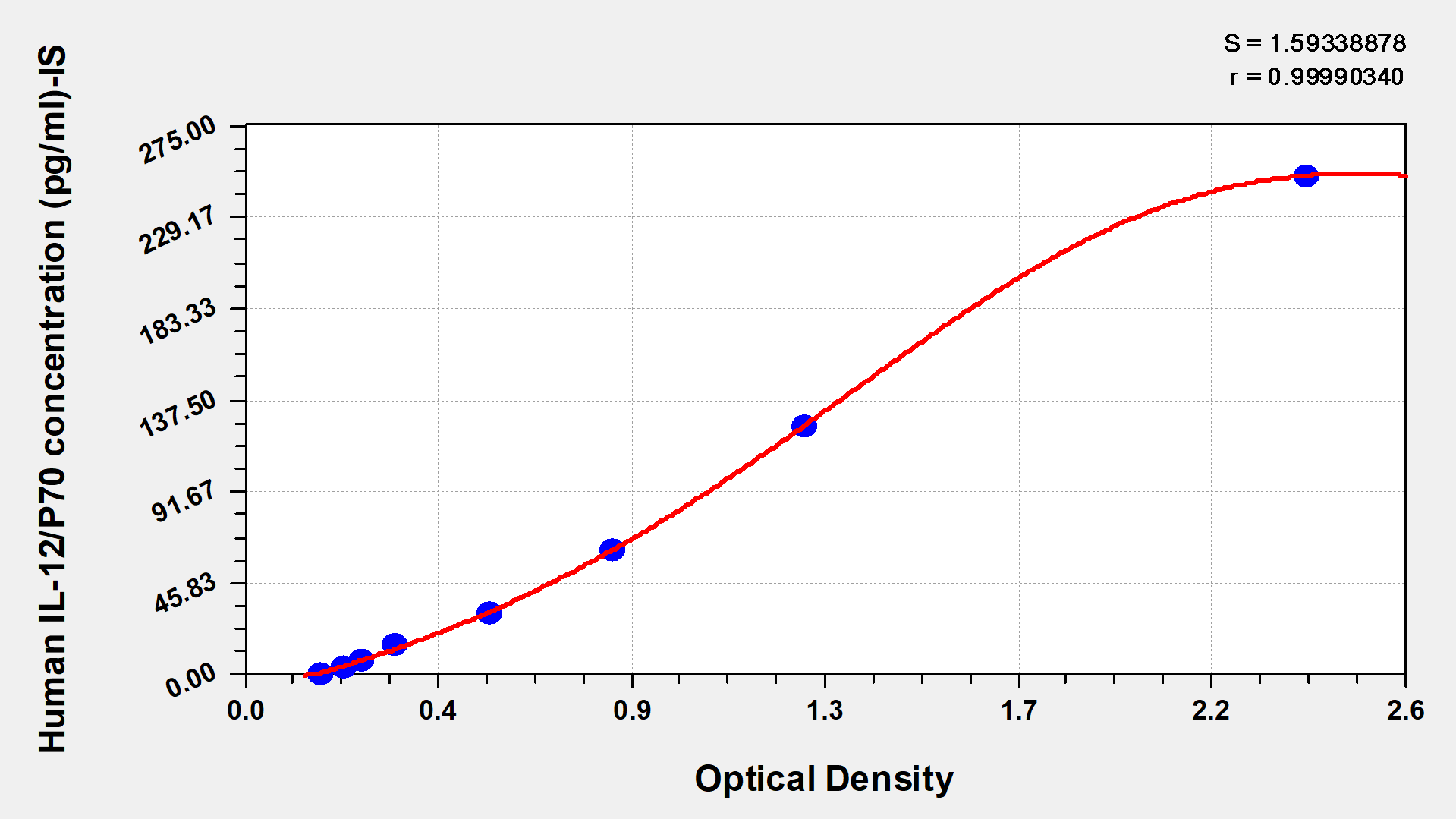-
中文名称:人胰岛素样生长因子结合蛋白4(IGFBP-4)酶联免疫试剂盒
-
货号:CSB-E04592h
-
规格:96T/48T
-
价格:¥3200/¥2500
-
其他:
产品详情
-
产品描述:人胰岛素样生长因子结合蛋白4(IGFBP-4)酶联免疫试剂盒(CSB-E04592h)为双抗夹心法ELISA试剂盒,定量检测血清、血浆、组织匀浆样本中的IGFBP4含量。IGFBP4即胰岛素样生长因子结合蛋白4,它是调节胰岛素样生长因子活性的关键蛋白。其与多种生理及病理过程相关。研究机制上,主要通过结合胰岛素样生长因子,影响细胞的增殖、分化与凋亡,在肿瘤、代谢疾病等研究中受关注。试剂盒检测范围为62.5 ng/mL-4000 ng/mL,灵敏度为15.6 ng/mL。适用于探索IGFBP-4在生理或病理状态下的表达变化,如疾病模型中的代谢调控研究、肿瘤微环境分析或药物干预实验中的生物标志物检测,为揭示IGF信号通路机制提供可靠数据支持本品仅用于科研,不用于临床诊断,产品具体参数及操作步骤详见产品说明书。
-
别名:AI875747 ELISA Kit; BP 4 ELISA Kit; BP4 ELISA Kit; Deb2 ELISA Kit; HT29 IGFBP ELISA Kit; IBP 4 ELISA Kit; IBP-4 ELISA Kit; IBP4 ELISA Kit; IBP4_HUMAN ELISA Kit; IGF binding protein 4 ELISA Kit; IGF-binding protein 4 ELISA Kit; IGF-BP4 ELISA Kit; IGFBP 4 ELISA Kit; IGFBP-4 ELISA Kit; IGFBP4 ELISA Kit; Insulin Like Growth Factor Binding Protein 4 ELISA Kit; Insulin-like growth factor-binding protein 4 ELISA Kit
-
缩写:IGFBP4
-
Uniprot No.:
-
种属:Homo sapiens (Human)
-
样本类型:serum, plasma, tissue homogenates
-
检测范围:62.5 ng/mL-4000 ng/mL
-
灵敏度:15.6 ng/mL
-
反应时间:1-5h
-
样本体积:50-100ul
-
检测波长:450 nm
-
研究领域:Signal Transduction
-
测定原理:quantitative
-
测定方法:Sandwich
-
数据处理:
-
货期:3-5 working days
引用文献
- FERMT2 upregulation in CAFs enhances EMT of OSCC and M2 macrophage polarization X Ma,Oral diseases,2023
- Evaluation of Potential Biomarkers for Traditional Chinese Medicine-Based Chronic Heart Failure Syndromes; a case-control study Y Jiang,European Journal of Integrative Medicine,2023
相关产品
靶点详情
-
最新研究进展:胰岛素样生长因子结合蛋白4(IGFBP4)是一种重要的胰岛素样生长因子(IGF)调节蛋白,其主要功能是通过与IGF1和IGF2结合调节IGF信号通路。IGFBP4在肿瘤发生和发展中扮演重要角色,其表达水平与多种恶性肿瘤相关,如乳腺癌、卵巢癌、前列腺癌等。IGFBP4不仅参与肿瘤细胞增殖和生存调控,还影响肿瘤血管生成和免疫逃逸。
-
功能:IGF-binding proteins prolong the half-life of the IGFs and have been shown to either inhibit or stimulate the growth promoting effects of the IGFs on cell culture. They alter the interaction of IGFs with their cell surface receptors.
-
基因功能参考文献:
- The authors also identified single-nucleotide polymorphisms in NRP2 and IGFBP4 loci that increase and reduce risk of lichen planus in hepatitis C virus-infected patients, respectively. PMID: 28065765
- the results of this study raise the possibility that human mesenchymal stem cells actions involve a negative-regulatory mechanism that suppresses Treg proliferation by releasing IGFBP-4 PMID: 28724578
- IGFBP-4 maybe act as a potential negative regulator in the progression of lung cancer through downregulation of COX-2. PMID: 28150906
- Patients with type 2 Diabetes Mellitus had lower serum concentrations of IGFBP-4 compared to controls. PMID: 28179448
- Data show that insulin-like growth factor binding protein-4 (IGFBP-4) was significantly elevated in lupus nephritis, particularly those with renal pathology chronicity changes. PMID: 27019456
- The present study provides the first evidence that apoptosis inhibitor of macrophages binds to IGFBP2, 3 and 4. PMID: 26135353
- Data show that co-transfection with cDNA encoding stanniocalcin-1 abrogates the proteolytic activity of pregnancy-associated plasma protein-A (PAPP-A) toward IGF-binding protein 4 (IGFBP-4). PMID: 26195635
- PLasma IGFBP-4 levels are not acutely altered following myocardial infarction treated with heparin and percutaneous coronary intervention. PMID: 25489725
- High IGFBP-4 fragment levels were associated with increased all-cause and cardiovascular mortality rates in T1D patients with and without diabetic nephropathy. PMID: 26046968
- Data indicate co-localization of insulin-like growth factor binding proteins IGFBP-4, IGFBP-5 in the syncytiotrophoblast layer of first trimester placental villi as early as 5 weeks of gestational age. PMID: 25475528
- IGF-1/IGFbp4 signaling regulated the post-developmental adipose tissue expansion. PMID: 24778188
- Despite the relation of CT-IGFBP4 to a more severe coronary artery disease, CT- and NT-IGFBP4, in contrast to our report based on total PAPP-A, failed to predict any long-term outcomes in patients with stable cardiovascular disease. PMID: 24201068
- these findings demonstrate an oncogenic property for IBP in promoting the metastatic potential of breast cancer cells. PMID: 23975422
- PAPP-A and IGFBP-4 gene expression (microarray analysis) was significantly upregulated in IL-1beta- or TNF-alpha-exposed cells. PMID: 24060054
- IGFBP-4 modulates the efficiency of estrogen-triggered activation of the Akt/PKB signaling pathway which has been associated with growth factor/ ERalpha cross-talks. PMID: 23499909
- Epigenetic silencing of UCHL1 and IGFBP4 in giant cell tumors may be important for malignant transformation of the cells PMID: 23603559
- IGFBP-4 was by far the most predominant IGFBP by immunoassay PMID: 23079385
- role of IGFBP-4 in regulating IGF bioavailability and provide new clues for the prevention and treatment of FGR (Fetal growth restriction). PMID: 22689691
- IGF1 haplotypes are associated with genetic susceptibility to high myopia in Chinese adults, whereas IGFBP3 and IGFBP4 are unlikely to be important in the genetic predisposition to high myopia PMID: 22332214
- The resistance of VEGF-stimulated angiogenesis to IGFBP-4 inhibition appears to depend on sustained activation of p38 MAPK as blocking its activity restored the anti-angiogenic effects of IGFBP-4 on VEGF-induced blood vessel growth in vivo PMID: 22134921
- This study demonistrated that IGFBP4 was significantly decreased in skeletal muscel in patient with amyotrophic lateral sclerosis. PMID: 22246875
- circulating IGFBP-4 levels are not influenced by secondary hyperparathyroidism in vitamin D deficiency rickets PMID: 21274331
- This is a first report documenting that IGFBP-4 expression in RCC activates cell growth, metastasis, Wnt/beta-catenin signaling and may be involved in RCC metastasis. PMID: 21207373
- These findings suggest that the expression of IGFBP-4 in adenocarcinoma cells in vivo is downregulated by epigenetic silencing in association with tumor differentiation, resulting in disruption of the mechanism of IGFBP-4-mediated growth inhibition. PMID: 21166939
- enterocyte HT-29 cell differentiation correlates with an increase in IGFBP-4 levels PMID: 12163000
- results are the first evidence of IGF-independent IGFBP-4 actions on granulosa cell steroidogenesis PMID: 12193384
- role in sequestration of insulin-like growth factor-1 and consequent impairment of insulin-like growth factor-1 action in skeletal tissue PMID: 12733722
- A novel SP3 binding site was identified in the promoter of IGFBP4. PMID: 14767471
- IGFBP-4 proteolysis and local regulation of IGF availability may be altered in malignant ovarian epithelial cells PMID: 15146551
- Data suggested that growth factor- and cytokine-mediated changes in IGFBP abundance regulate postnatal fibroblast cell. proliferation PMID: 15204833
- IGFBP-4 is a novel dB-cAMP-induced anti-angiogenic and anti-tumorigenic mediator that may be a promising candidate for glioblastoma therapy. PMID: 16586492
- Overexpression of IGFBP-4 in vivo has been reported to decrease the growth of prostate cancer and altered expression of IGFBP-4 in vivo in colon and other cancers needs to be explored as locally available IGFs appear to stimulate mitogenesis. (review) PMID: 16685432
- local increased collagen synthesis was preceded by an elevation of local concentration of IGFBP-4, suggesting that IGFBP-4 may have a key role in the IGF-axis effect on the human collagen synthesis in vivo PMID: 16973813
- the IGF system may have a limited role in the pathogenesis of GCT with PAPP-A subserving a function other than IGFBP-4 proteolysis PMID: 17177834
- Ratios between IGFBPs and IGF (insulin-like growth factors), different IGFBPs, sequential proteolytic cleavage of IGFBPs, and association of activating proteinases are key elements in the regulation of IGF receptor stimulation. PMID: 17312271
- IGFBP-4 may have a role in increasing necrosis and apoptosis, but in decreasing mitosis PMID: 17824980
- conclusion: decreased IGFBP-4 tumor expression might be a step in the progression from primary to metastatic melanoma; data lend support to a recently-described novel tumor suppressor role of secreting IGFBPs in melanoma PMID: 19025658
- IGFBP4, which can inhibit IGF action, also increased during in-vitro decidualization of cultured human ESCs. PMID: 19038974
显示更多
收起更多
-
亚细胞定位:Secreted.
-
数据库链接:
Most popular with customers
-
Human Transforming Growth factor β1,TGF-β1 ELISA kit
Detect Range: 23.5 pg/ml-1500 pg/ml
Sensitivity: 5.8 pg/ml
-
-
-
Mouse Tumor necrosis factor α,TNF-α ELISA Kit
Detect Range: 7.8 pg/ml-500 pg/ml
Sensitivity: 1.95 pg/ml
-
-
-
-



